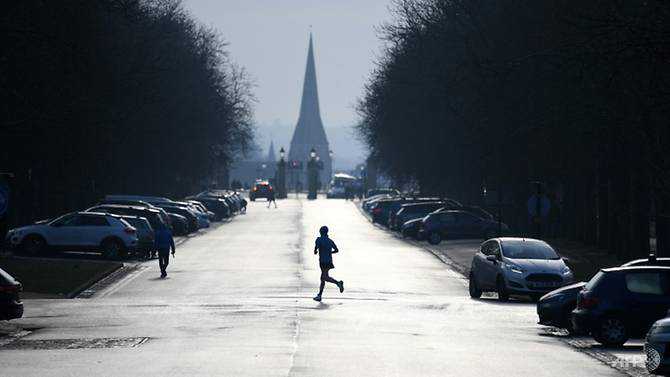New warning on COVID-19 vaccine supplies sparks EU concern
24 January, 2021

A warning from AstraZeneca that preliminary products of its COVID-19 vaccinations to Europe will be lower than expected has sparked innovative concern over the rollout of inoculations, with most countries arranging a sharp drop in deliveries.
Friday's announcement by the British pharmaceutical firm followed another the other day by Pfizer, which stated it could delay shipments of its vaccine for up to a month because of works at its important plant in Belgium.
The companies' warnings include worry deepening over new COVID-19 variants, particularly the one that emerged in Britain and which is extra infectious than the original strain.
Overall, Europe has now recorded a lot more than 692,000 deaths and nearly 32 million infections.
EUROPE has up to now approved vaccines from Pfizer and its own German partner BioNTech and also from US company Moderna.
It has not yet approved the vaccine from AstraZeneca and its own spouse the University of Oxford, but is likely to decide by Jan 29.
AstraZeneca said in its assertion that if EU approval is granted, the "original volumes will be less than anticipated", although the start wouldn't normally be delayed.
The business blamed "reduced yields at a making site within our European supply chain."
It said it could in any case provide you with the EU with "an incredible number of dosages" while ramping up production in February and March.
The announcement resulted in "deep dissatisfaction" from EU member states, which "insisted on an accurate delivery schedule," said European health commissioner Stella Kyriakides.
"VERY, VERY BAD NEWS"
Austrian health minister Rudolf Anschober called it "very, very bad news flash" and reported his country would receive in February only slightly more than half of the 650,000 AstraZeneca doses it had anticipated.
Lithuania said it was expecting an 80 % decrease in AstraZeneca doses in the first quarter.
Some authorities officials however sought to reassure their countries - weary and battered by months of the pandemic and already on the subject of edge over gradual vaccination rollouts.
"We've new vaccines on the way. We've Pfizer, which is increasing its development capacities," French sector minister Agnes Pannier-Runacher advised French radio.
"We had indicated a million persons vaccinated by the finish of January. We are in 950,000 today, so that objective will get surpassed."
An Italian senior health official said that Italy will have to rethink its COVID-19 vaccination programs if supply problems persist.
The united states had already had to cut its daily inoculations by more than two thirds as a result of delays in deliveries of shots from US drugmaker Pfizer, Franco Locatelli, the top of Italy's higher health council, told a press conference.
Now that AstraZeneca has also warned of cuts in deliveries to its dosages - even while they await clearance for employ found in the bloc - Italy may need to redraw its national roll away at the end of the month, he said.
Vaccinations in Italy have slowed to 20,000 to 25,000 a day from peaks of more than 90,000 around two weeks ago, Locatelli said.
The EU had at first ordered up to 400 million doses of the AstraZeneca vaccine.
Altogether, the EU has secured contracts for more than 2 billion vaccine doses for a total population of 450 million.
The AstraZeneca vaccine has the good thing about being cheaper to create than that of its rivals together with being better to store and transport.
"ASTRAZENECA DELIVERIES Found in FEBRUARY"
German health minister Jens Spahn also sought to downplay the announcement's effect, saying that following the jab's expected approval on a week's time "you will have AstraZeneca deliveries on February".
Though he added: "Just how much, we must nonetheless clarify with AstraZeneca and the European Union in the times ahead."
Spahn acknowledged this is significantly less than expected. The delay showed the creation of vaccines was a more complex task than some media headlines recommended, he added.
Spahn renewed his promise that the government would be able to make a vaccination offer to all or any citizens who wanted to get the shot simply by the summertime. "If the anticipated approvals for additional vaccines come, it'll stay that approach," Spahn said.
Sweden's national vaccination coordinator Richard Bergstrom said he expects his nation to receive around 700,000 dosages in the initial month following the vaccine is authorised in comparison to 1 million expected initially.
Norway, which isn't an EU member but which follows decisions made by the bloc's EMA regulator, expressed "disappointment".
The country's FHI wellbeing authority now plans to get only 200,000 AstraZeneca doses in February - much less compared to the 1.12 million in the beginning expected.
Meanwhile, the Pfizer delay announced last week was continuing to cause criticism.
Pfizer said on Jan 15 that modifications in its Puurs factory were necessary to crank up vaccine production potential from mid-February.
"We believe that Pfizer is normally currently at fault," Domenico Arcuri, Italy's particular commissioner for the pandemic, stated in La Stampa newspaper on Saturday, confirming the united states organized to pursue legal actions against the company.
"The 20 per cent decrease in Pfizer vaccine products isn't an estimation, but a sad certainty," he said, adding that Italians' health had not been "negotiable".
French European affairs minister Clement Beaune in Friday called about Pfizer to "honour its commitments".
Source: www.channelnewsasia.com
TAG(s):
